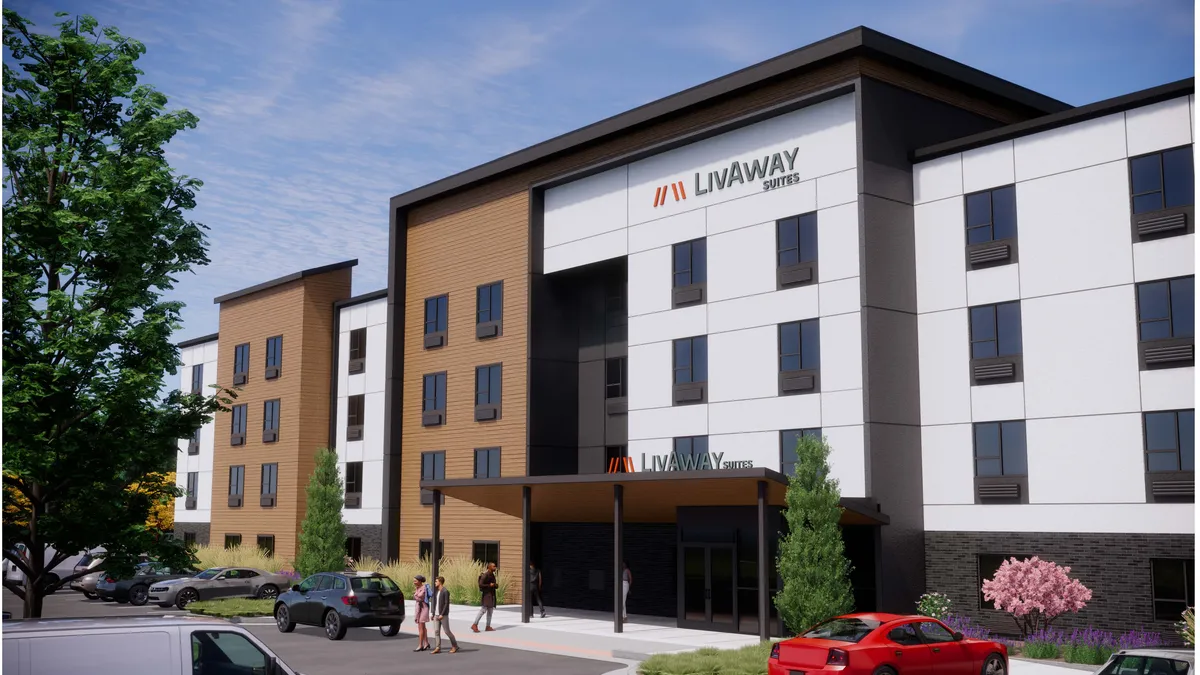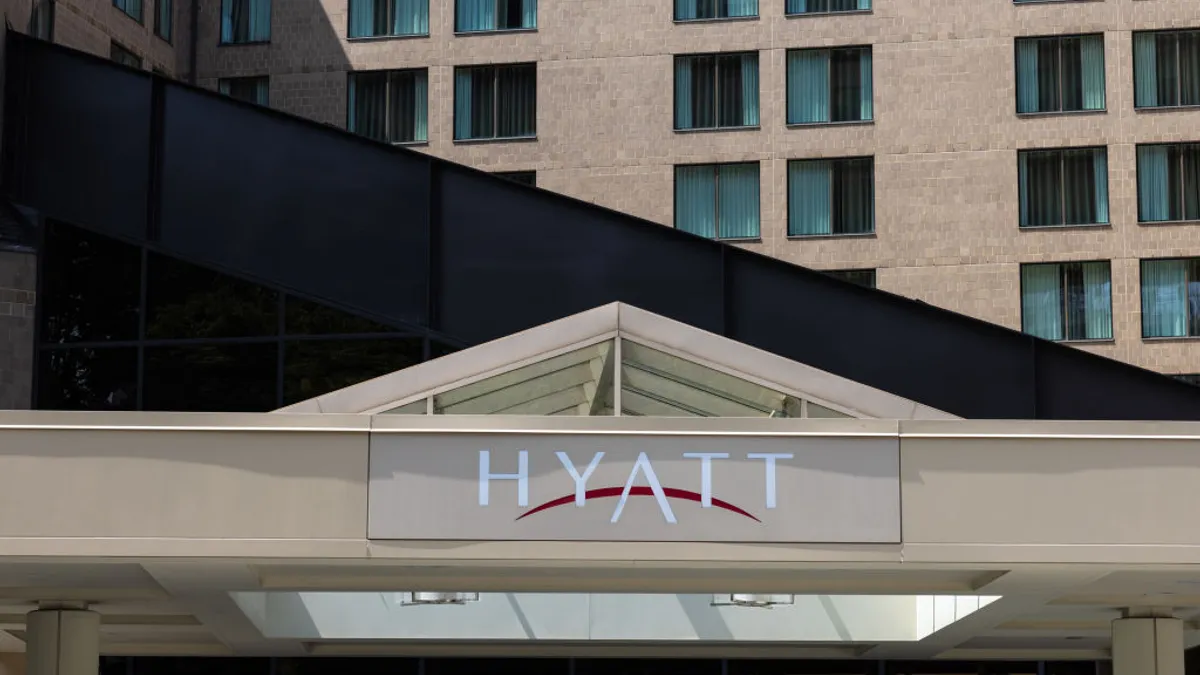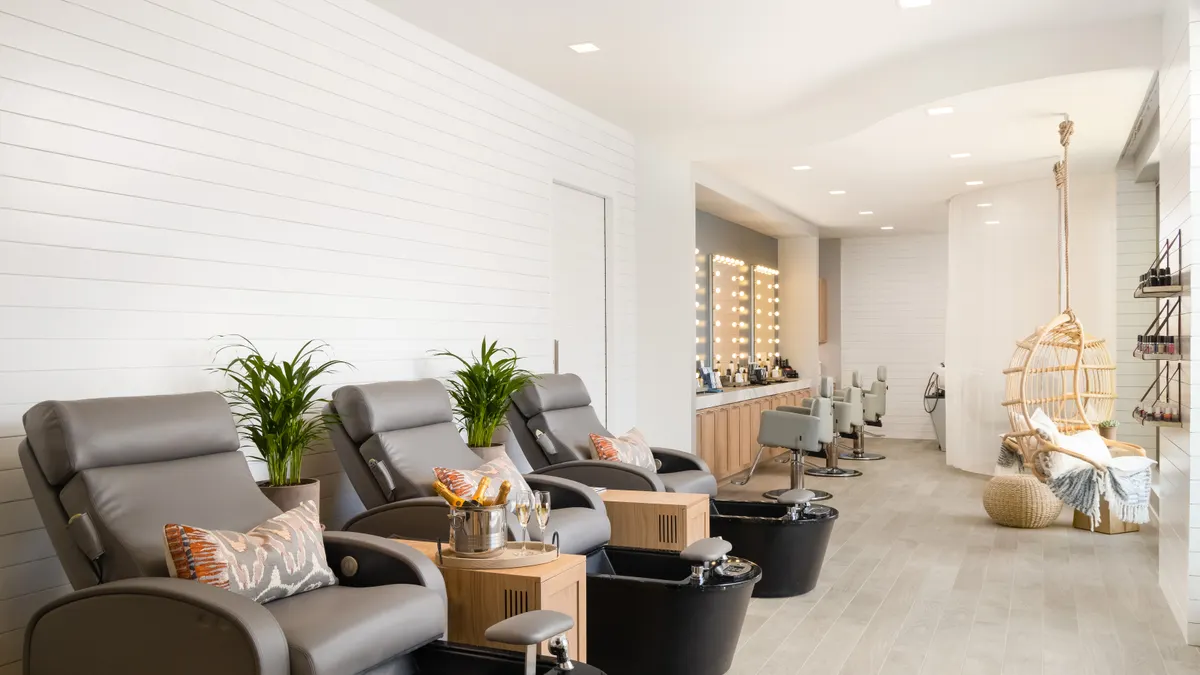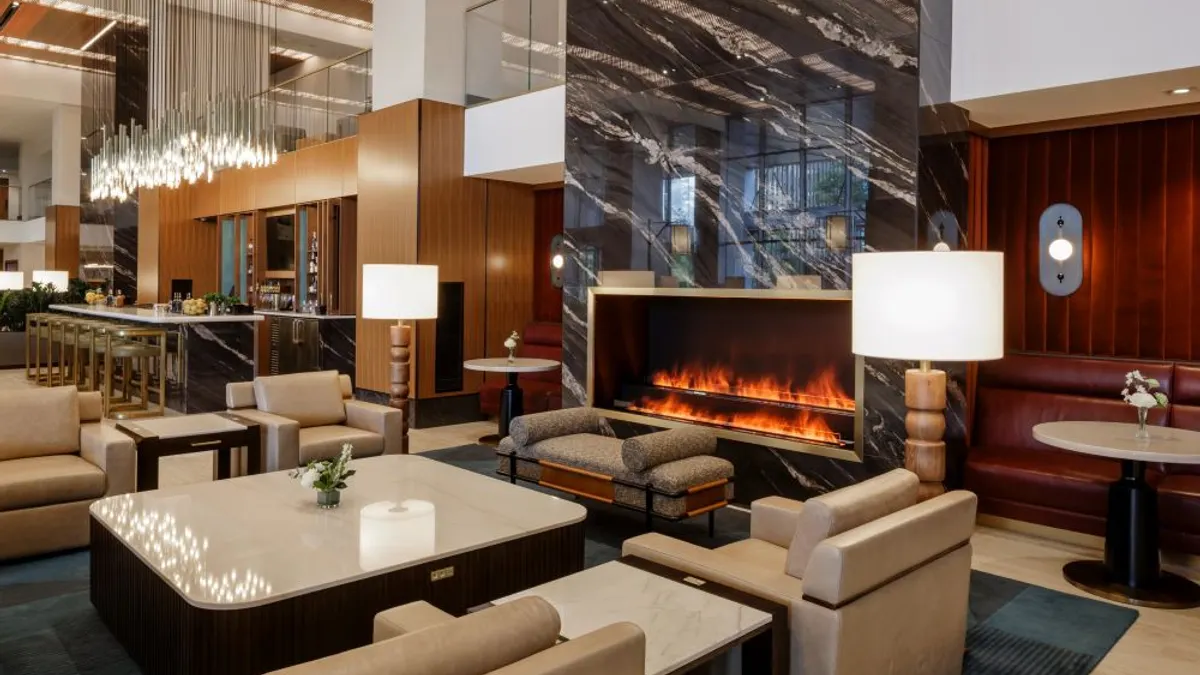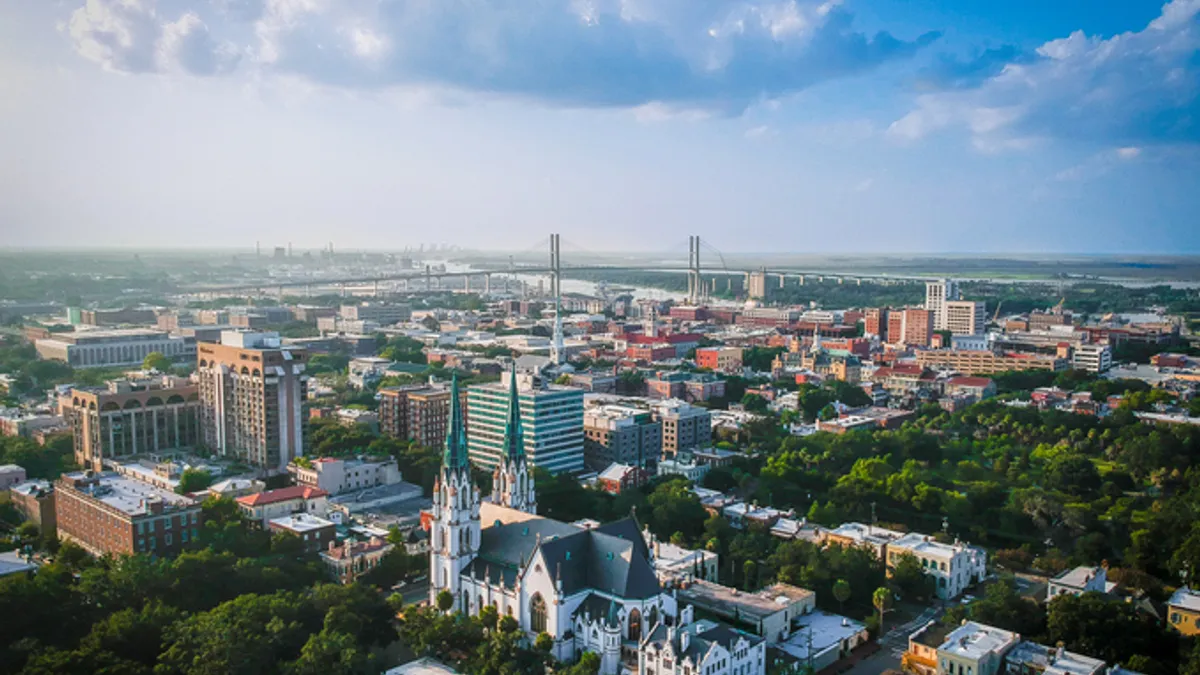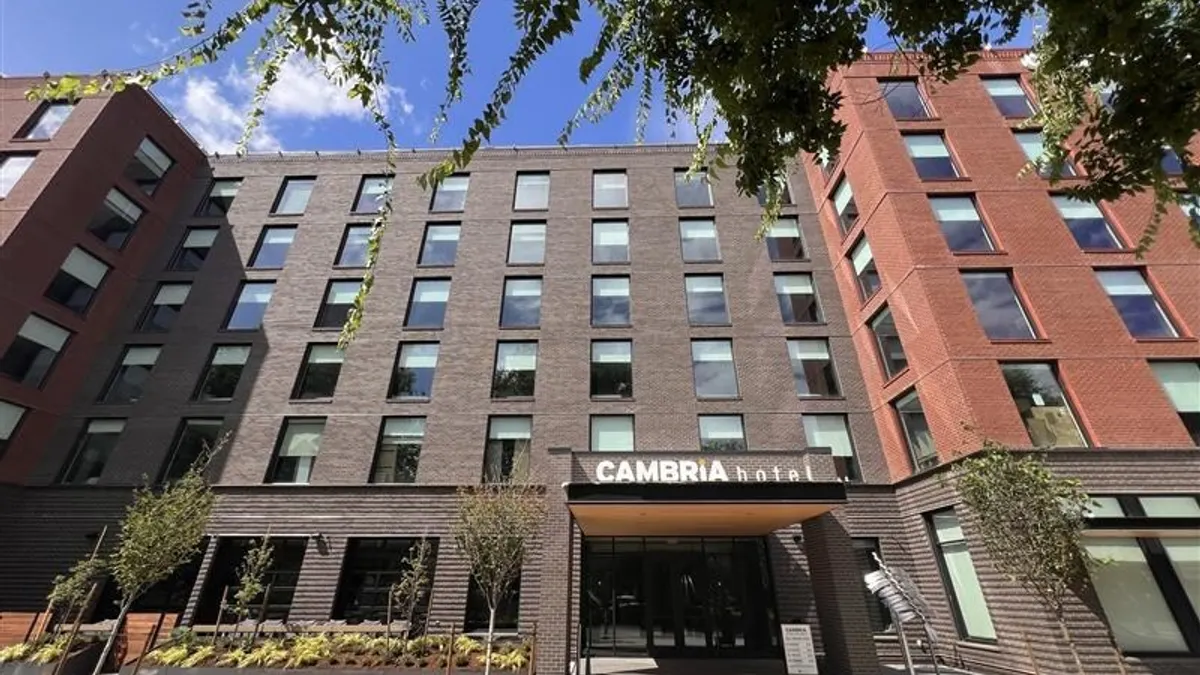Extended stay hotels continue to be desirable to owners and developers alike, with major industry players launching brands, investing capital and inking development deals in the space.
Despite an abundance of competition, economy extended stay brand LivAway Suites launched last year with an ambitious goal of growing fast. This became reality when the brand broke ground on several hotels within months of its debut.
In 2024, those growth plans have only accelerated, and they will be carried out by a new development leader at the helm of the brand’s development engine: Bellevue, Washington-based West77 Partners.
Earlier this month, 16-year industry veteran Paul Duncan joined West77 as chief development officer. In the role, Duncan will aid LivAway Suites’ continued growth, including several planned groundbreakings this year.
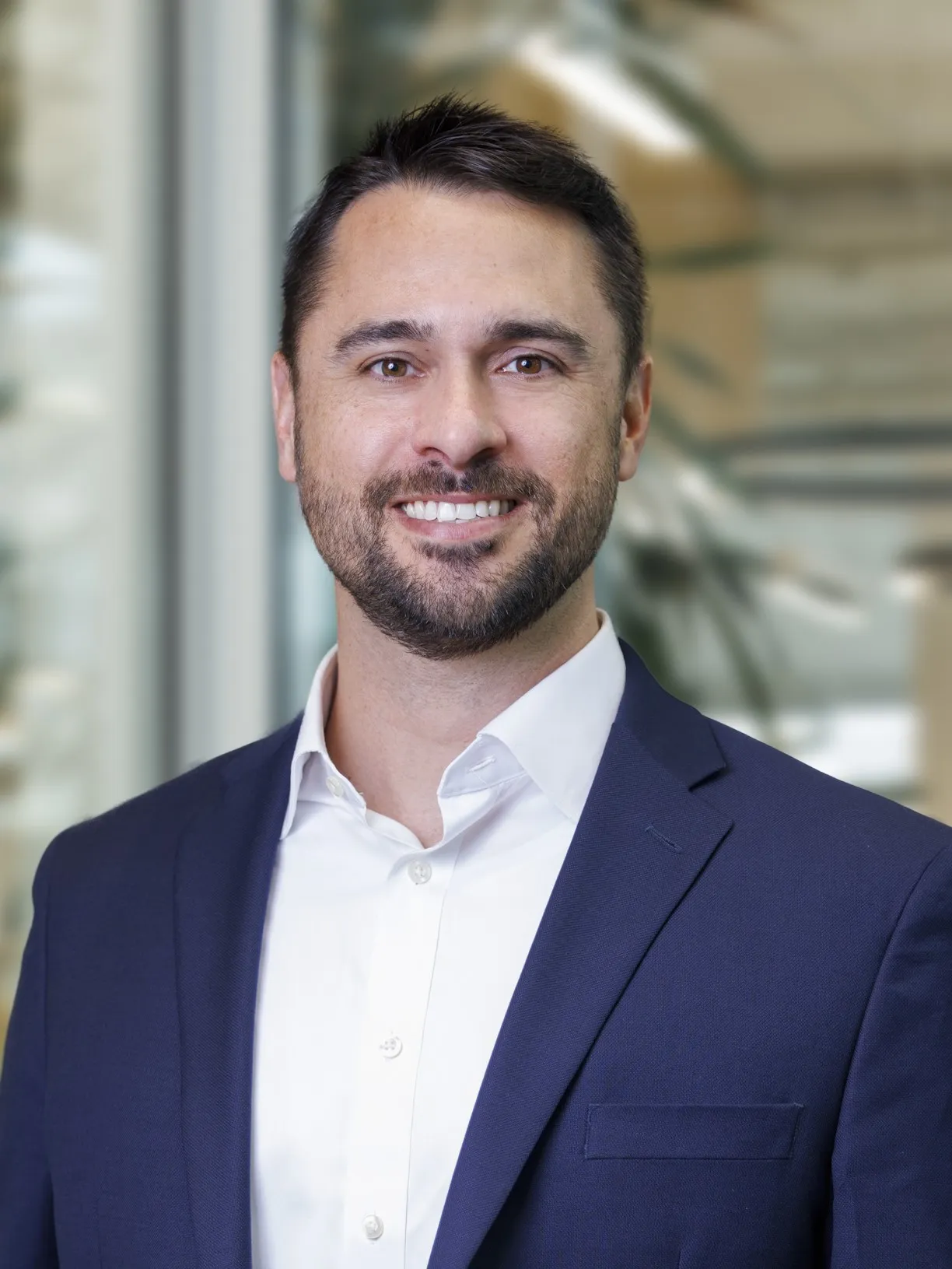
Duncan sat down with Hotel Dive to share LivAway Suites’ strategic expansion plans; what sets the brand apart from larger, more-established competitors like Marriott International and Wyndham Hotels & Resorts; and why extended stay remains one of the most stable and demanded hotel types.
Fast-tracked growth
LivAway Suites has “some pretty aggressive growth plans,” according to Duncan, who joined the hotel brand’s sister company West77 after holding the title of vice president of extended stay development at Concord Hospitality Enterprises.
Currently, LivAway is under construction on four hotels that are slated to open later this year and a few more that recently broke ground. The brand has another several hotels expected to break ground this year, Duncan shared.
By the end of this year, the brand’s portfolio will be closer to 15 hotels underway or open, Duncan said. And by the end of 2025, LivAway hopes to add another 30 hotels to its pipeline. The brand’s goal is to have 50 hotels under construction or open by 2026.
LivAway is specifically targeting markets that are benefiting from increased infrastructure spending following the Biden administration’s passing of a $1.2 trillion infrastructure bill in 2021.
This spending is expected to “dramatically increase the demand for economy extended stay hotels nationally over the coming years,” LivAway Suites CEO Mike Nielson said in a February statement.
The brand most recently broke ground on a hotel in DeWitt, New York, where Micron Technology is developing a $100 billion semiconductor factory. The infrastructure project is set to employ thousands of construction workers, many of whom will require a longer-term lodging option.
Infrastructure projects like Micron’s factory “are going to last years, and they’re going to bring in tons of employees,” Duncan said. “Those are exciting federal dollars that are coming into our markets that allow us to really have a nice runway.”
West77 is following those dollars, Duncan noted. For future LivAway hotels, the developer is targeting markets like Phoenix, where Taiwanese semiconductor manufacturing company TSMC is working on a $40 billion infrastructure project. Duncan said the developer is also eyeing Columbus, Ohio, and Albany, New York.
It’s not just construction workers, though, who demand extended stay hotels, Duncan said. A lot of guest demand LivAway sees comes from relocating corporate workers.
There are several markets across the U.S. that have seen an influx of corporate relocations following the pandemic, including Dallas.
Markets experiencing this trend that West77 is targeting for future LivAway developments include Nashville; Orlando and Tampa, Florida; and across Utah.
Duncan explained there has also been a rise in “digital nomads,” people who travel freely while working remotely from a computer. For these individuals, extended stay hotels can be an affordable way to stay in places longer-term, Duncan noted.
Developer demand
Extended stay is highly demanded by guests of various demographics, but that’s not the only reason the product type is a desirable option for owners and developers.
Another draw is the net operating income margin, which is “very impressive” within the extended stay segment, Duncan said.
“[Extended stay] is a very stable asset class. It’s one that is exciting because there is a lot of demand, but, more so, it drives a lot to the bottom line,” Duncan said.
“You get a revenue stream coming in, and when 50% of it goes into the [net operating income], that's a big portion,” he added. “It may not be as big of an NOI as say a Westin hotel, but you are investing quite a bit less, and you get a much more stable and long-term property that you don't have to worry about selling every night at $300 or $400 a night.”
The reason extended stay hotels can produce such high NOI margins is because of their “lean operating models,” Duncan shared. Extended stay hotels, particularly those in the economy segment, have less community amenity space and don’t require daily services like housekeeping, reducing their staffing needs.
“Right now, it is just difficult to find staff. So when [an extended stay property] only has eight people operating the hotel, [compared to] 300 people at the Westin, it is a night and day difference. It's much easier to operate when you need fewer people, and it drives more to the bottom line,” Duncan said.
Combined, the strong guest demand for extended stay, the product type’s high NOI margins and its operating efficiencies have made it “the darling of the industry right now,” Duncan said. And that’s why there is so much competition.
Segment standout
Despite LivAway being a smaller operation than many of its competitors, Duncan’s decision to join West77 was rooted, in part, by the developer’s bullishness on the brand.
During his tenure at Concord Hospitality, he worked on the development of hotels under brands like Choice Hotels’ WoodSpring Suites, Extended Stay America, Marriott’s StudioRes and Hilton’s LivSmart Studios.
“I got a peek under the hood of quite a few brands,” Duncan said, but LivAway “just spoke to me a little bit more.”
LivAway’s smaller size makes for a “more nimble” operation, Duncan said.
The brand can more easily adapt to changing guest and developer demand and quickly implement changes into its design and pipeline, according to Duncan.
That makes LivAway “a lot different” than some of the extended stay brands under big chains, like WaterWalk, which was recently acquired by Wyndham, Duncan noted.
“WaterWalk is a great product — it’s a different class in extended stay — but Wyndham didn't create that. Now they’re tasked to go out and sell it. They have to figure out what the WaterWalk brand is and how it will work into their system,” Duncan said.
“Some of those other brands, they’re just looking to figure out how to continue driving dollars to the bottom line for shareholders, and that’s not our goal,” he continued. “At LivAway, [the brand] is our sole focus, and that's how we treat it. We are not designing for anything else. We're designing for this specific guest, and I think that is going to resonate with a lot more people.”
Now that he’s chief development officer at West77, Duncan plans to stay the course it set for LivAway.
“Part of the reason why I joined is that I liked what I saw. I think LivAway has a very good product. They have it very well nailed down. But one of the changes that I hope you see in the near future is you’re gonna see our name a lot more.”



